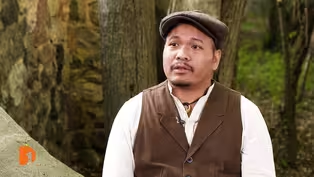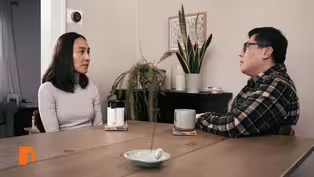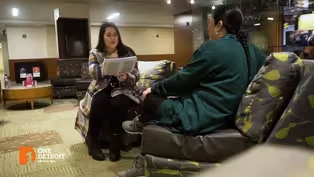
Jack Cheng and Paul Pham unpack what home really means
Clip: Season 8 Episode 46 | 3m 54sVideo has Closed Captions
Asian American friends Jack Cheng and Paul Pham share the common threads that connect them.
For Jack Cheng and Paul Pham, becoming friends could not have come at a better time. Meeting at a mutual friend’s house in Detroit led to a friendship rooted in introspection about their similar experiences — experiences they hadn’t talked about with anybody else before. In this clip from the AAPI Stories Series, Jack and Paul talk about what being Asian American means to them.
Problems playing video? | Closed Captioning Feedback
Problems playing video? | Closed Captioning Feedback
One Detroit is a local public television program presented by Detroit PBS

Jack Cheng and Paul Pham unpack what home really means
Clip: Season 8 Episode 46 | 3m 54sVideo has Closed Captions
For Jack Cheng and Paul Pham, becoming friends could not have come at a better time. Meeting at a mutual friend’s house in Detroit led to a friendship rooted in introspection about their similar experiences — experiences they hadn’t talked about with anybody else before. In this clip from the AAPI Stories Series, Jack and Paul talk about what being Asian American means to them.
Problems playing video? | Closed Captioning Feedback
How to Watch One Detroit
One Detroit is available to stream on pbs.org and the free PBS App, available on iPhone, Apple TV, Android TV, Android smartphones, Amazon Fire TV, Amazon Fire Tablet, Roku, Samsung Smart TV, and Vizio.
Providing Support for PBS.org
Learn Moreabout PBS online sponsorship(serene music) - I wonder if the sense of belonging that we started talking about, this conversation talking about, and maybe like how your definition of belonging has changed over time, and maybe what connection does that have to your being Asian American?
- Growing up, I think I wanted to fit in a lot.
And so I was very concerned with what other people thought of me and not very concerned with being Asian.
If anything, I probably pushed it away, and that continued for a long time, probably into my thirties when I finally sort of saw a lot of strength from it and saw that my parents had made a lot of hard choices as well.
So I guess it's like, yeah, finding belonging in an unfamiliar place or in the process of making it familiar and maybe never being completely part of it.
This may not be related, but I also had some resistance even to having this conversation.
I thought about calling it off and saying, "Well, I don't feel comfortable talking about it "because it involves interior difficult feelings "that I feel like would reflect badly on my family "or Asian culture in general."
It's like, maybe this is like a stereotype.
And then I realized that also is like, I think being part of Asian American is like bearing difficulty and not necessarily calling it out or making a big deal of it.
So that's knowing how much to say, how much to reach out for help, but also knowing that people care about each other, but they not may not be overly emotionally expressive like that's in a western way about it.
What about you?
How do you relate to being Asian American?
- I think it's actually taken me some time to even call myself Asian American.
Growing up in school, I'd always refer to my friends and myself as Chinese.
Being Asian American to me is about inhabiting that in between space and that it's about looking at that in betweenness as not something that's on the path to something else, but more of like expanding that so that it's like a place, its own place that you can inhabit.
And I think, we're living in Detroit.
We're living in the city that's dominated by cars.
It's like, there's a boulevard out the window that is like four car lanes wide, and it's like a pedestrian, you know, it's like for people.
There's all this circulation that takes us from one place to another.
I think that's been my experience of Asian Americanness almost.
It's like that I feel I'm always heading somewhere else and I'm always in motion towards something.
And I think really owning that label is more about thinking about how do I transform this road into its own place that is meant for human beings to inhabit.
- Oh, that's good.
I like it.
Like you're in a thoroughfare, and if you stop, that doesn't feel safe or comfortable.
- Yeah, like how do we turn the old freeway into a park, right?
That's sort of kind of like the question that I ask.
Dan Moen on growing up as a Filipino adoptee in Romeo
Video has Closed Captions
Clip: S8 Ep46 | 4m 11s | Dan Moen, an adoptee from the Philippines, shares his experience growing up in Romeo. (4m 11s)
Kyunghee Kim & Leo Chen’s shifting Asian American identities
Video has Closed Captions
Clip: S8 Ep46 | 5m 43s | Kyunghee Kim and Leo Chen have a conversation for One Detroit’s AAPI Stories Series. (5m 43s)
Two women bond through AAPI advocacy, APA Studies Class
Video has Closed Captions
Clip: S8 Ep46 | 7m 43s | Two women create a lasting bond through AAPI Advocacy and an APA Studies class at MSU. (7m 43s)
Providing Support for PBS.org
Learn Moreabout PBS online sponsorship
- News and Public Affairs

Top journalists deliver compelling original analysis of the hour's headlines.

- News and Public Affairs

FRONTLINE is investigative journalism that questions, explains and changes our world.












Support for PBS provided by:
One Detroit is a local public television program presented by Detroit PBS


